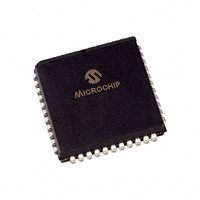PIC17C42A-16/L Microchip Technology, PIC17C42A-16/L Datasheet - Page 75

PIC17C42A-16/L
Manufacturer Part Number
PIC17C42A-16/L
Description
IC,MICROCONTROLLER,8-BIT,PIC CPU,CMOS,LDCC,44PIN,PLASTIC
Manufacturer
Microchip Technology
Series
PIC® 17Cr
Datasheets
1.PIC16F616T-ISL.pdf
(8 pages)
2.PIC17C42A-16P.pdf
(241 pages)
3.PIC17C42A-16P.pdf
(4 pages)
Specifications of PIC17C42A-16/L
Rohs Compliant
YES
Core Processor
PIC
Core Size
8-Bit
Speed
16MHz
Connectivity
UART/USART
Peripherals
POR, PWM, WDT
Number Of I /o
33
Program Memory Size
4KB (2K x 16)
Program Memory Type
OTP
Ram Size
232 x 8
Voltage - Supply (vcc/vdd)
4.5 V ~ 6 V
Oscillator Type
External
Operating Temperature
0°C ~ 70°C
Package / Case
44-PLCC
Processor Series
PIC17C
Core
PIC
Data Bus Width
8 bit
Data Ram Size
232 B
Interface Type
SCI, USART
Maximum Clock Frequency
16 MHz
Number Of Programmable I/os
33
Number Of Timers
4
Maximum Operating Temperature
+ 70 C
Mounting Style
SMD/SMT
Development Tools By Supplier
ICE2000
Minimum Operating Temperature
0 C
Lead Free Status / RoHS Status
Lead free / RoHS Compliant
For Use With
AC164317 - MODULE SKT MPLAB PM3 44PLCCDVA17XL441 - DEVICE ADAPTER FOR PIC17C42A309-1007 - ADAPTER 44-PLCC ZIF TO 40-DIPAC174002 - MODULE SKT PROMATEII 44PLCC
Eeprom Size
-
Data Converters
-
Lead Free Status / Rohs Status
Details
Other names
PIC17C42A-16/LR
PIC17C42A-16/LR
PIC17C42A-16/LR
Available stocks
Company
Part Number
Manufacturer
Quantity
Price
Company:
Part Number:
PIC17C42A-16/L
Manufacturer:
Microchip Technology
Quantity:
10 000
- Current page: 75 of 241
- Download datasheet (2Mb)
12.1.3
Two high speed pulse width modulation (PWM) outputs
are provided. The PWM1 output uses Timer1 as its
time-base, while PWM2 may be software configured to
use either Timer1 or Timer2 as the time-base. The
PWM outputs are on the RB2/PWM1 and RB3/PWM2
pins.
Each PWM output has a maximum resolution of
10-bits. At 10-bit resolution, the PWM output frequency
is 24.4 kHz (@ 25 MHz clock) and at 8-bit resolution the
PWM output frequency is 97.7 kHz. The duty cycle of
the output can vary from 0% to 100%.
Figure 12-5 shows a simplified block diagram of the
PWM module. The duty cycle register is double buff-
ered for glitch free operation. Figure 12-6 shows how a
glitch could occur if the duty cycle registers were not
double buffered.
The user needs to set the PWM1ON bit (TCON2<4>)
to enable the PWM1 output. When the PWM1ON bit is
set, the RB2/PWM1 pin is configured as PWM1 output
and forced as an output irrespective of the data direc-
tion bit (DDRB<2>). When the PWM1ON bit is clear,
the pin behaves as a port pin and its direction is con-
trolled by its data direction bit (DDRB<2>). Similarly,
the PWM2ON (TCON2<5>) bit controls the configura-
tion of the RB3/PWM2 pin.
FIGURE 12-6: PWM OUTPUT
1996 Microchip Technology Inc.
PWM
output
Note
USING PULSE WIDTH MODULATION
(PWM) OUTPUTS WITH TMR1 AND TMR2
In this example, PWM period = 50. Old duty cycle is 30. New duty cycle value is 10.
The dotted line shows PWM output if duty cycle registers were not double buffered.
If the new duty cycle is written after the timer has passed that value, then the PWM does
not reset at all during the current cycle causing a “glitch”.
Timer
interrupt
0
10
Write new
PWM value
20
30
40
0
Timer interrupt
new PWM value
transferred to slave
FIGURE 12-5: SIMPLIFIED PWM BLOCK
Note 1: 8-bit timer is concatenated with 2-bit internal Q clock
PWxDCH
(Slave)
Duty Cycle registers
Comparator
PRy
or 2 bits of the prescaler to create 10-bit time-base.
TMR2
Comparator
(Note 1)
DIAGRAM
Clear Timer,
PWMx pin and
Latch D.C.
Read
Write
PIC17C4X
PWxDCL<7:6>
R
S
Q
DS30412C-page 75
PWMxON
RCy/PWMx
Related parts for PIC17C42A-16/L
Image
Part Number
Description
Manufacturer
Datasheet
Request
R

Part Number:
Description:
IC MCU OTP 2KX16 PWM 40DIP
Manufacturer:
Microchip Technology
Datasheet:

Part Number:
Description:
IC MCU OTP 2KX16 PWM 40DIP
Manufacturer:
Microchip Technology
Datasheet:

Part Number:
Description:
IC MCU OTP 2KX16 PWM 44-MQFP
Manufacturer:
Microchip Technology
Datasheet:

Part Number:
Description:
IC MCU OTP 2KX16 PWM 44PLCC
Manufacturer:
Microchip Technology
Datasheet:

Part Number:
Description:
IC MCU OTP 2KX16 PWM 44PLCC
Manufacturer:
Microchip Technology
Datasheet:

Part Number:
Description:
IC MCU OTP 2KX16 PWM 44-MQFP
Manufacturer:
Microchip Technology
Datasheet:

Part Number:
Description:
IC MCU OTP 2KX16 PWM 44TQFP
Manufacturer:
Microchip Technology
Datasheet:

Part Number:
Description:
IC MCU OTP 2KX16 PWM 44-MQFP
Manufacturer:
Microchip Technology
Datasheet:

Part Number:
Description:
IC MCU OTP 2KX16 PWM 44TQFP
Manufacturer:
Microchip Technology
Datasheet:

Part Number:
Description:
IC MCU OTP 2KX16 PWM 40DIP
Manufacturer:
Microchip Technology
Datasheet:

Part Number:
Description:
IC MCU OTP 2KX16 PWM 40DIP
Manufacturer:
Microchip Technology
Datasheet:

Part Number:
Description:
IC MCU OTP 2KX16 PWM 40DIP
Manufacturer:
Microchip Technology
Datasheet:

Part Number:
Description:
IC MCU OTP 2KX16 PWM 44-MQFP
Manufacturer:
Microchip Technology
Datasheet:

Part Number:
Description:
IC MCU OTP 2KX16 PWM 44PLCC
Manufacturer:
Microchip Technology
Datasheet:

Part Number:
Description:
IC MCU OTP 2KX16 PWM 44-MQFP
Manufacturer:
Microchip Technology
Datasheet:











